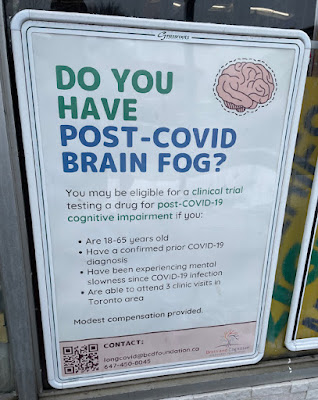If you're relatively young and healthy, is a mild case of COVID-19 really “mild”, like a cold or the flu? Are you still at risk for long COVID — a persistent state of fatigue, anxiety, insomnia, exercise intolerance, and “brain fog” (impairments in memory, attention, and concentration) — even if you're fully vaccinated?
If you have post-COVID brain fog and live in Toronto, you might be eligible for a clinical trial run by the Brain and Cognition Discovery Foundation. The study will assess the effects of vortioxetine (brand name Trintellix), an FDA-approved antidepressant that may improve cognitive function in people with depression. It has a complex mechanism of action as a “serotonin reuptake inhibitor, agonist of the 5-HT1A receptor, and antagonist of the 5-HT3 and 5-HT7 receptors.” The clinical trial is a randomized, double-blind, placebo-controlled study that plans to enroll 200 participants.
Trintellix™ was approved by Health Canada in 2014, meaning it's fully covered by the government if you have major depressive disorder (MDD). It's an expensive drug ($423 a month) with no generic version, so too bad if you live in the US and suffer from MDD-related cognitive dysfunction, since most forms of insurance won't cover it.
Long covid with neuro symptoms:
— David Fisman (@DFisman) January 2, 2022
Not real enough to be factored in to disease prevention plans
Real enough for drug trials
Cool pic.twitter.com/o0y1wHlOnS
Are there any differences in outcome between the delta and omicron variants? What about all the long haulers who weren't able to obtain a definitive COVID-19 test? These are only two of many important questions.
Meanwhile, it's well-documented that unvaccinated individuals are 13 times more likely to be
hospitalized and 20 times more likely to die than fully vaccinated
individuals. Why is this so hard to understand??

No their not
ReplyDelete